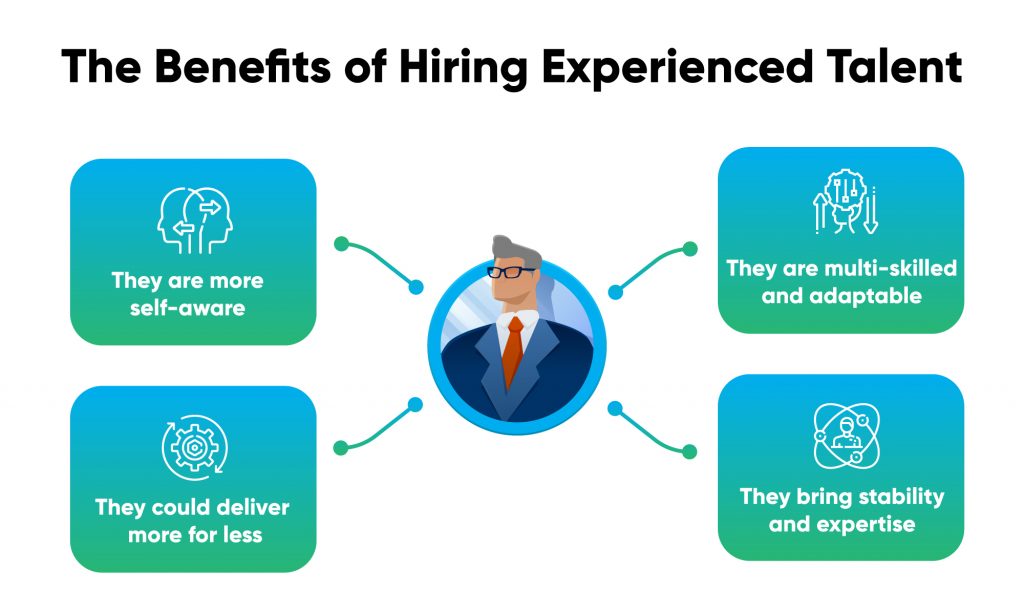Prejudices in the Hiring Process Extend Beyond Traditional Notions of Diversity
Too many organizations, it seems, treat the notion of diversity as one exclusive to race and ethnicity. However, an employment culture that promotes universal equality among its workers and bars all forms of discrimination doesn’t stop there. The nature of diversity is itself quite diverse, and biases reach far beyond the standard concepts. They also include gender identity, sexual orientation, religion, physical disabilities, and more. Candidates face other discrimination and employment challenges outside the traditional ideas of diversity, such as veterans, the long-term unemployed, and older workers.
In this post, we’re going to focus on the struggles that plague America’s mature workers and the opportunities that abound for employers who actively source and recruit them. Like the long-term unemployed, older workers find themselves fighting biases and misperceptions about their abilities from hiring managers. And they, too form an underutilized and overlooked pool of available talent.
The Leadership Drought
Countless organizations continue to center their recruitment efforts on Millennials and Zoomers, likely because there’s a lot these generations of talent have to offer. They have in-demand STEM skills, are perhaps the most technologically savvy group of candidates on the market, possess drive and gumption, long to contribute to innovation, and bring fresh perspectives to the industries they support. And undeniably, the fact remains that they are young.
But do they have the leadership skills necessary for future business growth? Organizations across nearly all industries say they are confronting a leadership drought, which they worry could hinder their progress. Even though this started a few years ago, this issue is still imperative. Millennials and Zoomers aren’t lacking the characteristics or determination to become tomorrow’s great leaders, they’re lacking the experience.
In an increasingly competitive and fast-paced labor market, we believe that nobody should be overlooking the potential that mature candidates bring to the conference table. Here are some of the top reasons why seasoned talent, if strategically positioned, can become any company’s ace in the hole.
The Benefits of Hiring Experienced Talent

Older workers bring less risk
Building a culture that encourages creativity and innovation is a mission-critical strategy for progress and sustainability. It’s also why companies are aggressively courting Millennial and Gen Z talent. These youthful mavericks enjoy taking risks. They see these gambles as necessary systems of trial and error that lead to true innovation. And although business leaders want what these creative types have to offer, many become reluctant about how independent non-conformists can be recruited and integrated into established work cultures. There are countless executives who would love to get their hands on the next Steve Jobs, Walt Disney or Richard Branson, yet an equal number would likely admit that they wouldn’t want to manage those personalities.
Risk takers are essential to business success in this dynamic century, yet that doesn’t mean organizations have become less risk-averse. There’s a difference. To ensure the proper functioning of a well-oiled machine, employers need established and experienced professionals who can maintain order and temper the risk-taking of creative mavericks. Candidates in their 40s and 50s have seen it all with their longer resumes and list of accomplishments. They’ve navigated the sometimes turbulent waters of office politics, have learned to work through bureaucratic processes, bring team building and management expertise, understand different work cultures, and have weathered the peaks and valleys that accompany dynamic business cycles. The background, achievements and history of older candidates are also well documented, making them easy to assess and place for recruiters.
Older talent are more self-aware
The young talent entering the workforce aren’t just gaining skills and experience – they’re embarking on a journey of self-discovery. And there’s certainly something attractive about hiring talent who can be shaped and taught. They’re filled with passion, energy, and an eagerness to develop. However, as part of this rite of passage, young workers may also discover that they don’t enjoy the jobs they’re doing. Their quest to grow can sometimes make them greater flight risks.
Older candidates are considerably more likely to be grounded. They have cultivated their identities and their work ethics. They know precisely who they are – their strengths, abilities, potential and areas of improvement. The self-awareness of older talent better positions them to be strong and candid communicators, mentors, soundboards for lessons learned and best practices, and pillars of patience in times of change or disruption.
Older talent are multi-skilled and adaptable
As organizations focus on business models that emphasize smart, lean operations, ideal candidates tend to be those who can wear many hats. Talent who are 40+ probably have closets full of different headpieces – some familiar, some more exotic. They may have undergone several transformations throughout their careers, moving from customer service to sales to professional services and beyond.
In addition to holding down diverse roles, older talent have worked for a greater variety of industries, company sizes, and teams, picking up valuable qualifications along the way. As they’ve aged, they’ve undoubtedly mastered essential skills, engineered unique solutions to problems, and become specialists in specific areas – an advantage to any employer. Their decades of hands-on work, vocational development, real-world education, and proven dedication make older talent ideal team leaders.
Older talent could deliver more for less through contingent engagements
It used to be that contract workers were viewed as low-level clerical or blue-collar types who couldn’t find a full-time job. On the contrary, today contractors can be found in nearly every industry and in executive positions, including the C-suite.
In fact, the supertemp is quickly becoming the new norm. Supertemps are not hungry young whelps looking to make their marks – they are top managers and professionals who’ve completed formal education, been trained at industry-leading firms, and who’ve chosen to pursue freelance careers. Corporations are increasingly trusting this tenured talent to do mission-critical work on a contract basis, instead of relying on permanent employees.
And although supertemps find their freelance work to be lucrative, companies still save money by not having to invest in full-time talent. Other motivating factors for supertemps include flexibility in scheduling work hours, locations and assignments, and the ability to contribute and make a positive impact through mentoring and wisdom gained from decades in the market.
How Staffing Curators Bring Businesses and Older Talent Together
According to the U.S. Bureau of Labor Statistics, 60.3% of the population between 55 and 64 years of age were employed as of 2020, while those who are 65 years and older comprise 18% of the civilian labor force. Policy advisers with the American Association of Retired Persons (AARP) say that working through staffing firms has been one of the most effective ways for aging talent to find employment opportunities with less hassle and resistance.
Working through a temp agency helps seasoned candidates overcome job search-related hurdles before approaching prospective employers. And elite staffing curators generally provide counseling on resume preparation, interviewing and other career coaching. For business leaders, hiring older workers means hiring experience, dependability and a solid work ethic.
Enterprises that engage experienced staffing professionals with proven resources, cutting-edge recruitment methodologies and established networks will help put these hard-working and seasoned professionals into key positions, bridging the leadership gap and increasing the productivity of businesses across the nation.
Want to Hire the Best Mature Workforce?
Prosperix believes that the modern workforce thrives when the ideas and opinions are as diverse as the people behind them. As a minority-owned enterprise, we understand the value of diversity and cherish the opportunity to find talent with fresh perspectives and unique insights. We work with several organizations and programs to do our part in building a diverse workforce.
If you want the benefits of hiring a diverse workforce, schedule a demo with us today:

